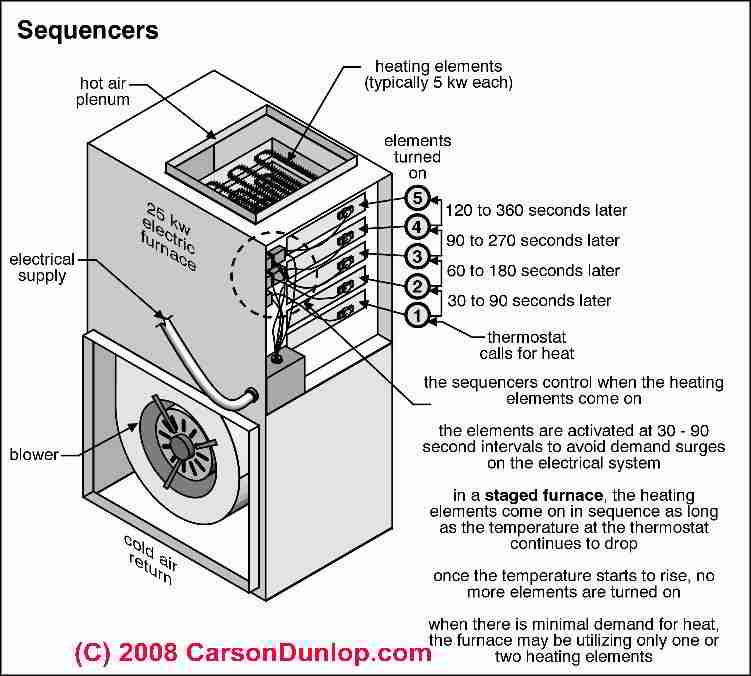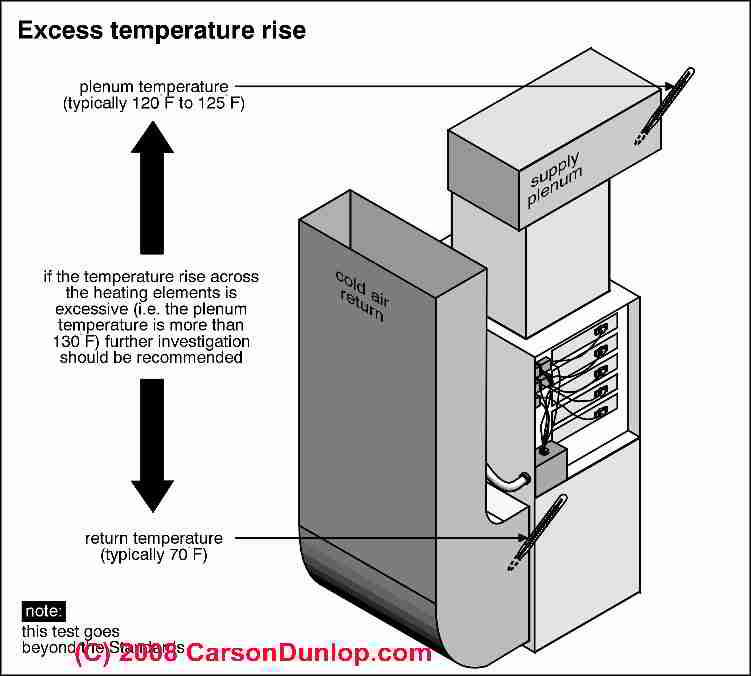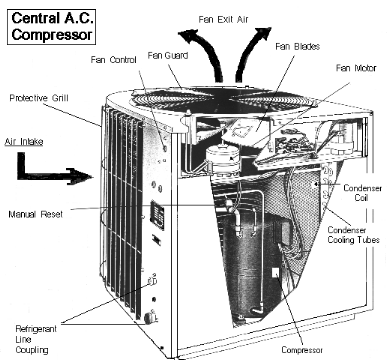 Heat Pump Backup Heat
Heat Pump Backup Heat
Diagnosis, Inspection, Repair Guide
- POST a QUESTION or COMMENT about backup heat systems for heat pumps
This article discusses the diagnosis & repair of backup heat systems used on heat pumps - how to find out if your backup heat is working or partly working, or not working at all.
This article series answers most questions about central air conditioning & heat pump system troubleshooting, inspection, and repairs. We describe how to inspect residential air conditioning systems (A/C systems) to inform home buyers, owners, and home inspectors of common cooling system defects.
InspectAPedia tolerates no conflicts of interest. We have no relationship with advertisers, products, or services discussed at this website.
- Daniel Friedman, Publisher/Editor/Author - See WHO ARE WE?
Diagnose and fix the backup heat - heat pump system not working
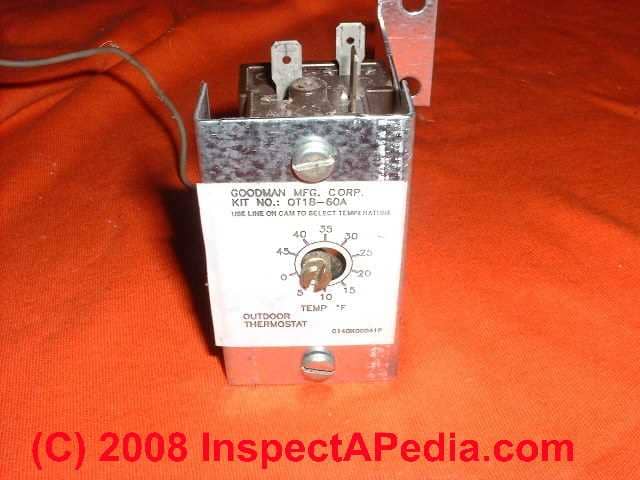 Diagnosing no backup heat working or not enough backup heat
Diagnosing no backup heat working or not enough backup heat
If you are getting no backup heat at all, or the heat is inadequate, your system may not be switching on the backup heat at all, or it may be trying to switch on the backup heat but the backup heat is not working.
Backup heat controls not working: when outdoor temperatures drop below a set point (varies by geographic location) the heat pump system will switch from cooling mode to heating mode.
In heating mode a heat pump is running pretty much the same as it did as an air conditioner, except in reverse.
That is, all of the same controls and components are involved.
In cooling mode where a heat pump is installed, the indoor evaporator coil is cooled in order to cool air blown across it. This is normal heating mode for the heat pump and backup heat is not called-for.
In heating mode the heat pump warms the indoor coil so that it will warm air blown across it, transferring heat from outside to inside.
When temperatures outside become too low for the heat pump to efficiently extract heat from outdoor air, a temperature sensor in the outdoor unit turns on the backup heat system.
Some of the critical controls that have to work in order for the heat pump to heat at all in cool weather, or to switch to backup heat mode include:
The indoor thermostat
- see THERMOSTATS
the outdoor temperature sensor
- see HEAT PUMP THERMOSTAT, OUTDOOR
the reversing valve that switches direction of refrigerant flow
- see REVERSING VALVE on HEAT PUMPS
Electric Backup Heat Not Working:
If the backup heat for your heat pump system is provided by electric heaters
see STAGED ELECTRIC FURNACES
below for an outline of the diagnostic steps needed.
The temperature at which backup heat should come on varies by where you live. Perhaps 35 degF. would be common.
If debugging the thermostats and temperature sensor do not lead to a fix, then the problem may be with the backup heater itself.
Hot water heat or water to air heat not working:
If your backup heat is an oil or fired water-to-air system you'll need to check the operation of the heating boiler.
See HEATING LOSS DIAGNOSIS-BOILERS
for a detailed diagnostic procedure. You will need to examine no-heat diagnosis first of the controls and fuel source and then of the boiler fuel type itself, oil, or gas.
Warm air backup heat not working:
If your backup heat is an oil or fired warm air system you'll need to check the operation of the furnace.
See HEATING LOSS DIAGNOSIS-FURNACES
for a detailed diagnostic procedure. As above, you will need to examine no-heat diagnosis first of the controls and fuel source and then of the furnace fuel type itself, oil, or gas (propane or natural gas) or electric.
Diagnosing backup heat that turns on when it should not.
Heat Pump Provides Heat when in Cooling Mode
if your heat pump is heating when it should be cooling there may be a simple problem with a thermostat, thermostat setting, or with a temperature sensor or control inside or outside the building. "Only gets heat when in cooling mode."
The following diagnostic tips were provided by a thoughtful reader, Neal Renn who describes the problem of a heat pump that insists on turning on backup heat when it is not needed.
That is, during the cooling season, the heat pump insists on providing warm air rather than cool air to the building.
The family woke up to an 85 degree house even though the weather remained in cooling season. The occupants found that the heat pump system was running in heat mode. (A Goodman™ 5 ton heat pump and Goodman indoor air handler with propane backup heat.
- The indoor thermostat
was checked to be sure it was set to cooling mode. (Thermostats might be set to "heat", "cool", "Auto", or "OFF" depending on the model.) - Backup heat on:
The occupants observed that the propane heater was running even though their indoor thermostat was set for cooling and outdoor temperatures and indoor temperatures were high enough that cooling was required. - Examine the dual fuel relay
and terminal block. - Examine the outside compressor condenser unit
- check the outside thermostat (GE Morrision). If the outdoor thermostat is not responding properly the system defaults to heat.
See this Detailed Case of a Heat Pump that Put out Heat when Cooling was Required
at HEAT PUMP THERMOSTSAT, OUTDOOR
for a step by step guide to diagnosing the cause of this particular "heat output only, no cooling" problem at a heat pump. Diagnostic details provided by a thoughtful reader, Neal Renn.
Here is a photograph of the heat pump outdoor thermosatt. It is housed in the control box corner of the outside heat pump compressor/condenser unit.
This heat pump outdoor unit has a control board, a contactor, a start capacitor and the outdoor thermostat which is used to determine when backup heat is needed.
Photographs courtesy of Neal Renn show a Goodman Manufacturing Corp. outdoor thermostat # OT18-60A (below left) and a back view of the control showing additional part numbers #B13708-66 (below right
For photographs of other air conditioning and heat pump parts, and for an explanation of where these air conditioning components are physically located,
See A/C or HEAT PUMP COMPONENTS which discusses and describes how to identify the indoor and outdoor components of an air conditioner or heat pump system.
Since the failure of the heat pump's backup heat to turn on, loss of heating capacity, reduced air conditioning output temperatures, loss of cool air supply, or even loss of air flow entirely can be due to a variety of problems with one or more components of an air conditioning or heat pump system, after reviewing the lost backup heat diagnosis procedures described in this article, be sure to also review the diagnostic procedures at each of the individual air conditioning diagnosis and repair major topics listed just below.
To return to our air conditioning, heat pump, and refrigeration home page go
to AIR CONDITIONING & HEAT PUMP SYSTEMS.
Staged Electric Furnaces Using Sequencers to Control Heat
If the backup heat source for your heat pump system is provided by an electric furnace, use the diagnostic details below when the backup heat is not working properly. This information is discussed further
at ELECTRIC HEAT.
For economy, as Carson Dunlop Associates' sketch shows, electric furnaces often use a gang of electric heating elements that are turned on in stages rather than all at once.
As temperatures fall and more heat is needed in the building, more heating stages turn on. By leaving heating stages turned off when not needed we reduce electrical consumption and energy cost.
On a staged electric heating furnace each heating stage typically provides about 5,000 watts (5KW) of heating energy.
The fan limit switch [image] that controls an electric furnace may have a built-in delay so that on a call for heat the blower fan won't turn on until the heating element(s) have warmed up. We discuss fan limit switches in more detail
How to Diagnose & Repair Electric Heat that Has Stopped Working or is Not Hot Enough
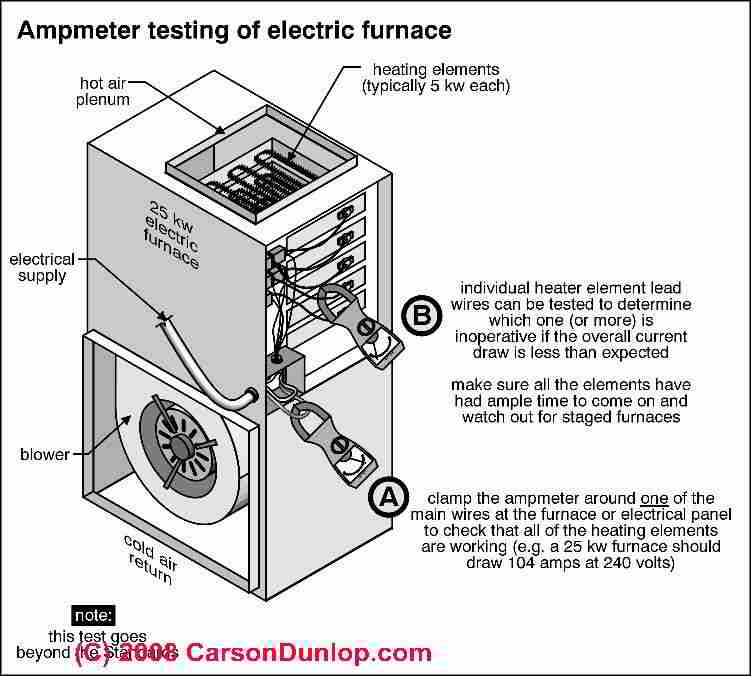
What do we check if our electric heat is not working? There are a few basic things to check yourself. Other steps require an expert. Sketches courtesy of Carson Dunlop Associates, Toronto [ carsondunlop.com ].
- Is the thermostat asking for heat?
Be sure you know where all of the thermostats for your electric heat are located.
Some heaters such as flush-in-floor electric heaters may use a wall-mounted thermostat while other electric baseboard heaters may have individual thermostats on each baseboard unit. In a bathroom with electric radiant heat in the floor, Carson Dunlop suggests finding that hidden thermostat [image], perhaps inside the sink vanity. - Is electrical power on to the heater?
Check the fuses or circuit breakers that supply each electric heater. - If the electric furnace does not seem to be making heat,
the electrician or heating technician will use an ammeter to test each of the heating elements to see if one or more of them is not working.
She will also check first to confirm that electrical power is on to the unit. If one or more of the staged electric heaters in the furnace has failed, the furnace may make warm air, but not enough warm air in very cold conditions. - Check the air temperature rise across the electric furnace.
When the furnace has been operating for 20 minutes or longer, typically the temperature at the return plenum (the lower thermometer in the sketch) will show about 70 deg .F. and the supply plenum temperature will be between 120 deg f. and 125 deg f.
If the supply plenum temperature is too high (over130 deg .f.) something's wrong and you should call a heating service technician. - Check radiant heat ceiling panels
for wire interruptions. If someone drove an nail into a radiant panel heat ceiling [image] or in the attic above they damaged a wire or heating panel, you may find that that room no longer has heat.
We use a hand-held infra-red thermometer scanner to quickly check radiant heat floors and ceilings.
...
...
Continue reading at HEAT PUMPS - home, or select a topic from the closely-related articles below, or see the complete ARTICLE INDEX.
Or see BACKUP HEAT for HEAT PUMP FAQs, diagnostic questions & answers posted originally at this page
Or see these
Recommended Articles
- DIAGNOSTIC GUIDE A/C or HEAT PUMP
- DIAGNOSTIC DETAILS A/C or HEAT PUMP
- HEAT PUMPS - home
- LOST COOLING CAPACITY - what to do when you're not getting cool air
Suggested citation for this web page
BACKUP HEAT for HEAT PUMPS at InspectApedia.com - online encyclopedia of building & environmental inspection, testing, diagnosis, repair, & problem prevention advice.
Or see this
INDEX to RELATED ARTICLES: ARTICLE INDEX to AIR CONDITIONING & HEAT PUMPS
Or use the SEARCH BOX found below to Ask a Question or Search InspectApedia
Ask a Question or Search InspectApedia
Try the search box just below, or if you prefer, post a question or comment in the Comments box below and we will respond promptly.
Search the InspectApedia website
Note: appearance of your Comment below may be delayed: if your comment contains an image, photograph, web link, or text that looks to the software as if it might be a web link, your posting will appear after it has been approved by a moderator. Apologies for the delay.
Only one image can be added per comment but you can post as many comments, and therefore images, as you like.
You will not receive a notification when a response to your question has been posted.
Please bookmark this page to make it easy for you to check back for our response.
IF above you see "Comment Form is loading comments..." then COMMENT BOX - countable.ca / bawkbox.com IS NOT WORKING.
In any case you are welcome to send an email directly to us at InspectApedia.com at editor@inspectApedia.com
We'll reply to you directly. Please help us help you by noting, in your email, the URL of the InspectApedia page where you wanted to comment.
Citations & References
In addition to any citations in the article above, a full list is available on request.
- Thanks to Neal Renn who described diagnosing the problem of a heat pump that "only gets backup heat and no cooling" to describe the problem of a heat pump that insists on turning on backup heat when it is not needed.
- In addition to citations & references found in this article, see the research citations given at the end of the related articles found at our suggested
CONTINUE READING or RECOMMENDED ARTICLES.
- Carson, Dunlop & Associates Ltd., 120 Carlton Street Suite 407, Toronto ON M5A 4K2. Tel: (416) 964-9415 1-800-268-7070 Email: info@carsondunlop.com. Alan Carson is a past president of ASHI, the American Society of Home Inspectors.
Thanks to Alan Carson and Bob Dunlop, for permission for InspectAPedia to use text excerpts from The HOME REFERENCE BOOK - the Encyclopedia of Homes and to use illustrations from The ILLUSTRATED HOME .
Carson Dunlop Associates provides extensive home inspection education and report writing material. In gratitude we provide links to tsome Carson Dunlop Associates products and services.


